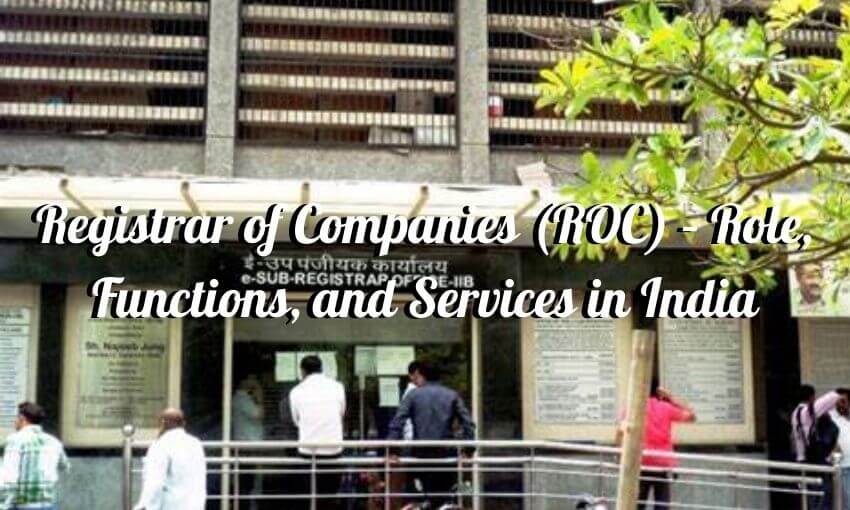Registrar of Companies (ROC): Understanding the Role and Responsibilities of the Government Agency in Company Incorporation
The Registrar of Companies (ROC) is a government body. It is responsible for registering and maintaining records of all companies and limited liability partnerships (LLPs) incorporated in India. The ROC is governed by the Ministry of Corporate Affairs and operates under the provisions of the Companies Act, 2013.

Firstly, the main function of the ROC is to ensure compliance with the laws and regulations related to companies and LLPs. This includes registering new companies and maintaining records of changes in company details. And ensuring that companies file their annual returns and financial statements on time.
In addition to these functions, the Registrar of Companies (ROC) also has the power to strike off companies that are no longer in operation. Also, investigate companies for non-compliance, and take action against companies that engage in fraudulent activities.
Registrar of Companies (ROC):
On top of that, the Registrar of Companies (ROC) is equally important and has a website that provides a variety of services to the public. Including the ability to search for company information, file forms, and documents, and view company records. The website also provides guidance and resources for starting and managing a company in India.
Responsibilities of Registrar of Companies (ROC)
Moreover, the Registrar of Companies (ROC) has a wide range of responsibilities to ensure compliance with the laws and regulations. That relates to companies and limited liability partnerships (LLPs) in India. Some of the key responsibilities of the ROC include:
Registering new companies:
Besides, the ROC is responsible for registering new companies and issuing certificates of incorporation to them. This includes verifying the necessary documents and information provides by the company at the time of registration. After that, see about maintaining records.
Maintaining records: Registrar of Companies (ROC)
Along with this, the ROC is responsible for maintaining accurate and up-to-date records of all registered companies and LLPs. This includes maintaining records of changes in company details. Such as changes in the company’s name registerer office address, or board of directors.
Filing annual returns and financial statements:
Subsequently, the ROC ensures that companies file their annual returns and financial statements on time. This includes verifying the accuracy and completeness of the information provided by the company. Further, about Investigating non-compliance.
Investigating non-compliance:
Furthermore, the ROC has the power to investigate companies for non-compliance with the laws and regulations related to companies and LLPs. This includes taking action against companies that fail to file their annual returns or financial statements on time. Next, striking off companies is an equally important key responsibility of ROC.
Striking off companies: Registrar of Companies (ROC)
In all this kind, the ROC has the power to strike off companies that are no longer in operation or have not been carrying on business for a period of time.
Taking action against fraudulent activities:
Also, ROC has the power to take action against companies that engage in fraudulent activities. Such as the misappropriation of funds or false representation of information. Next, information about providing guidance and resources. And then, about the access of ROC.
Providing guidance and resources:
Following this, The ROC provides guidance and resources to the public on starting and managing a company in India through its website.
Providing public access to company records:
Above all, the ROC provides public access to company records, including financial statements and annual returns, through its website.
Facilitating e-filing and online services: Registrar of Companies (ROC)
Besides, the ROC facilitates e-filing and online services for companies and the public to make the process of registering and maintaining records more efficient.
Monitoring compliance with laws and regulations:
Moreover, the ROC is responsible for monitoring compliance with laws and regulations related to companies and LLPs. Including the Companies Act, of 2013, and the Limited Liability Partnership Act, of 2008. This includes ensuring that companies comply with their statutory obligations. Such as filing their annual returns and financial statements on time.
Handling complaints and disputes:
Along with this, the ROC handles complaints and disputes related to companies and LLPs. This includes resolving disputes between shareholders, directors, and other stakeholders of a company.
Licensing and registering professionals:
Apart from this, the ROC licenses and registers professionals, such as company secretaries and chartered accountants. That involves the formation, management, and dissolution of companies.
Inspecting company records:
In addition, the ROC has the power to inspect the records of any company or LLP to ensure compliance with the laws and regulations. Next, the description for enforcement actions.
Enforcement actions:
Moreover, the ROC has the power to take enforcement actions against companies and LLPs that do not comply with the laws and regulations. Next, this includes imposing fines, and penalties, and even winding up the company.
In short, the Registrar of Companies plays a crucial role in ensuring the transparency and accountability of companies in India. And then, it helps to protect the rights of shareholders and other stakeholders. The ROC commits to ensuring compliance with the laws and regulations. And providing efficient and effective services to the public and companies.
Content from other States:
- No items




